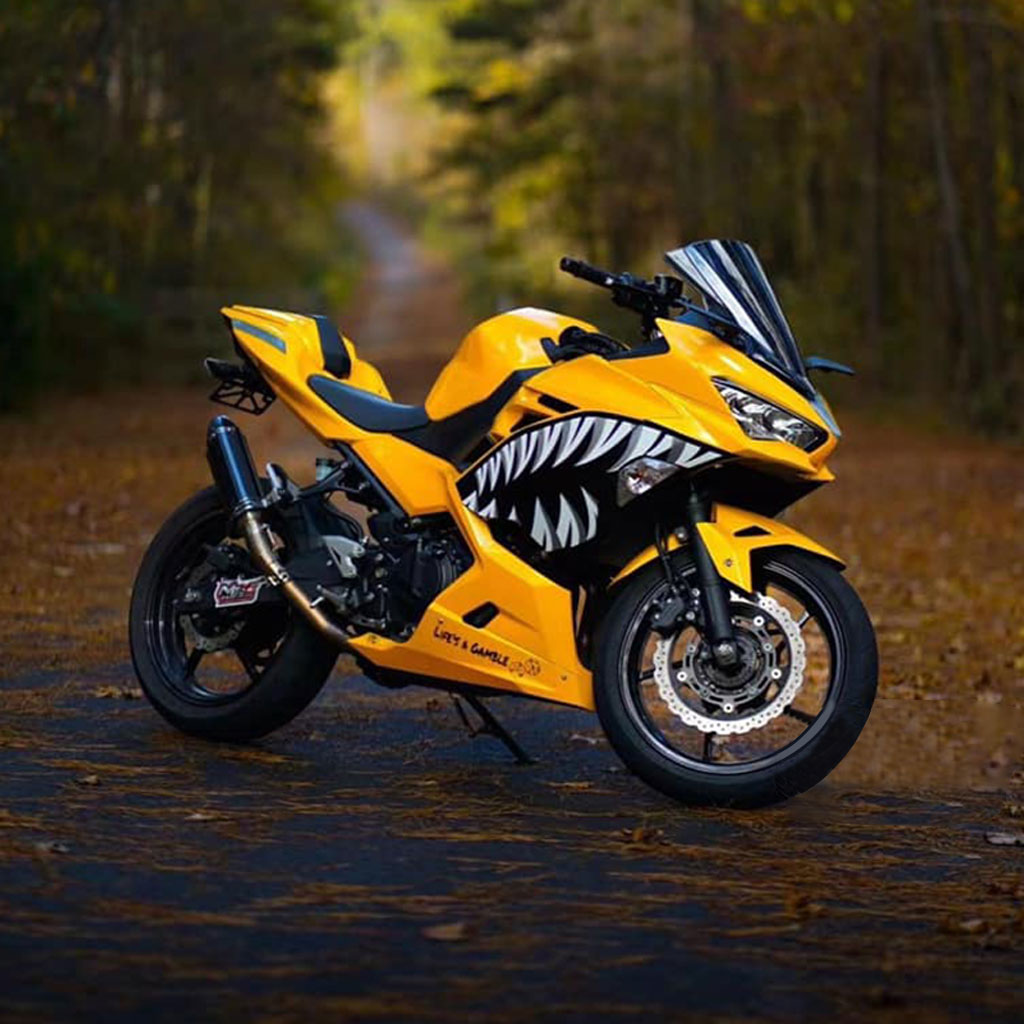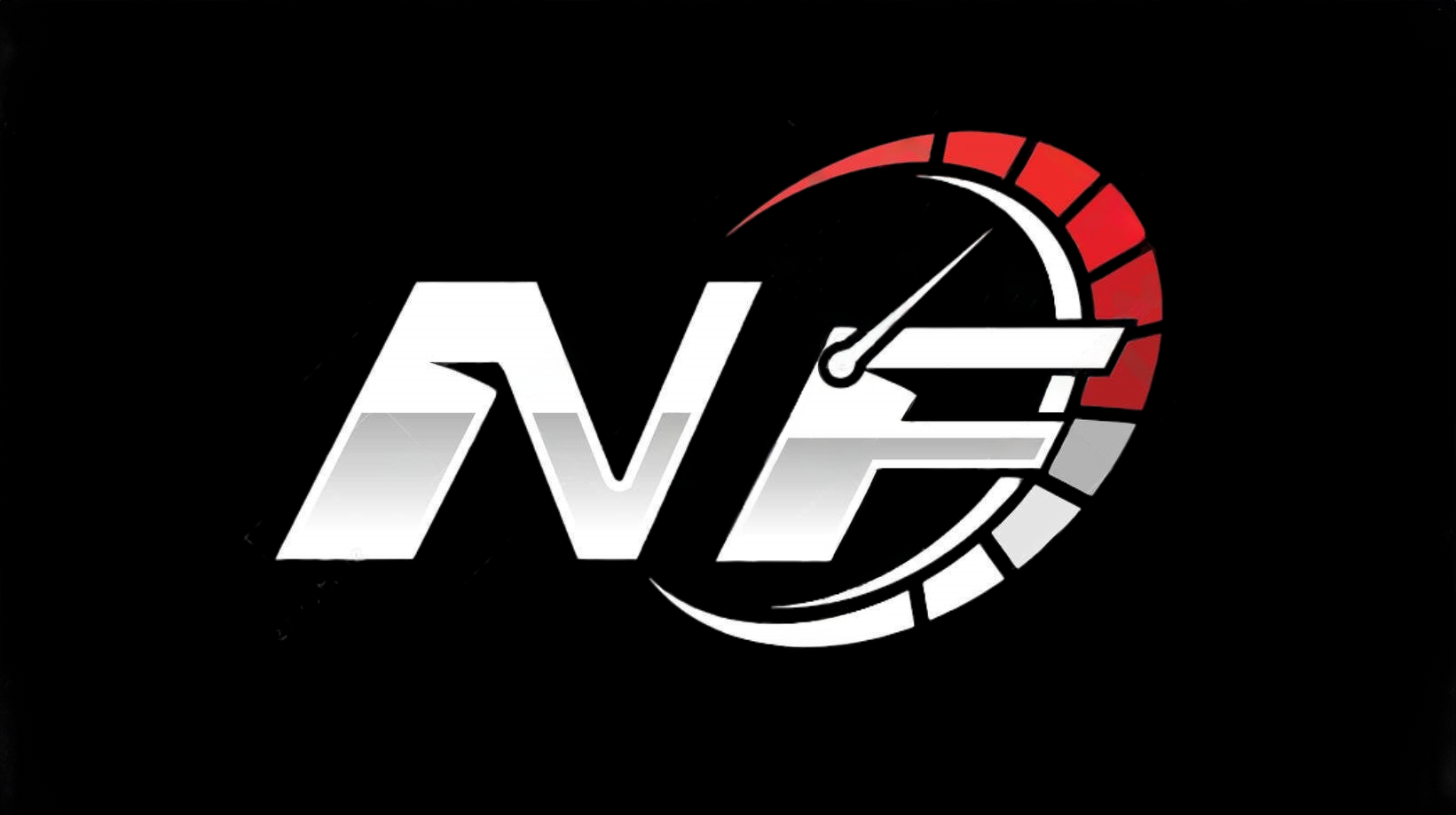How the 05 Kawasaki ZX10R Stacks Up with Today’s Liter Bikes
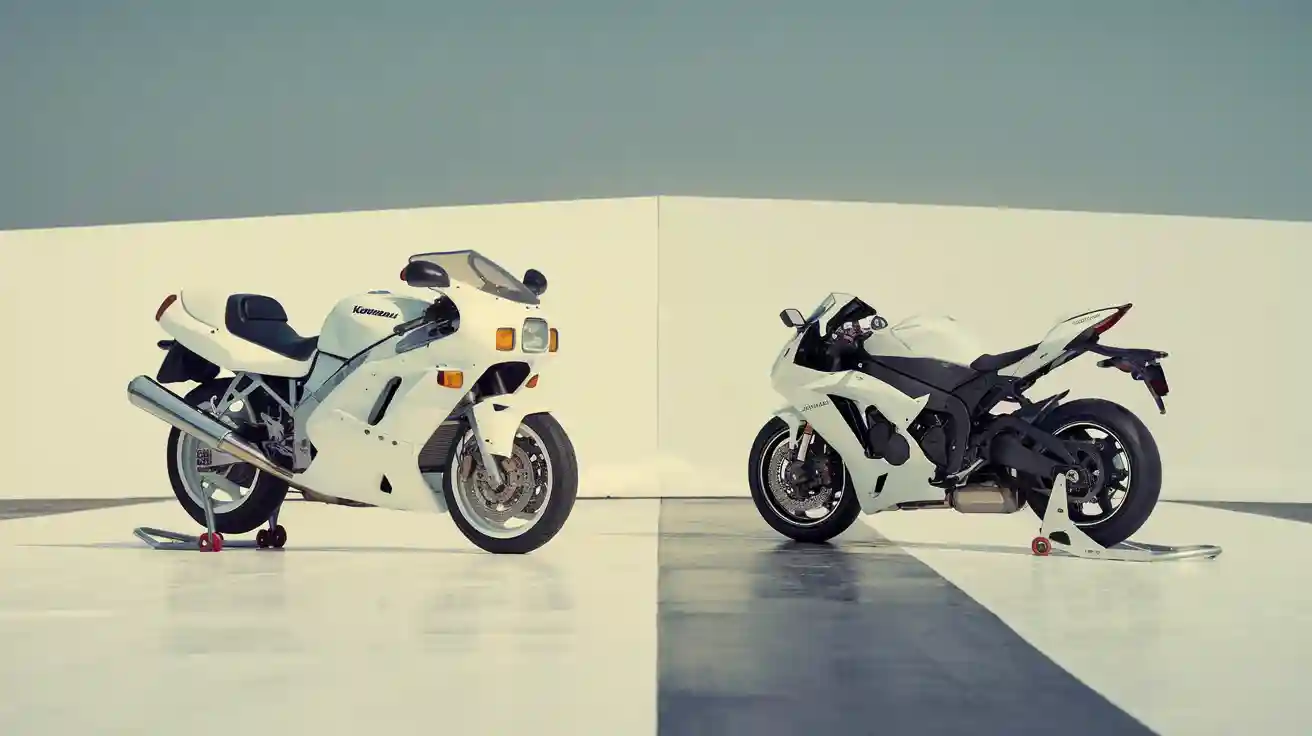
The 05 kawasaki zx10r brings a raw and thrilling ride to the streets. Riders often describe this ninja as light and agile, with a feel closer to a 600cc sports bike than a typical liter bike. The 2005 kawasaki zx10r delivers about 150 horsepower to the tire, making it powerful for its size. Many compare the handling of this kawasaki ninja to modern bikes, but the older ninja stands out for its aggressive character.
| Motorcycle Model | Year | Dry Weight (kg) |
|---|---|---|
| Suzuki GSX-R 1000 | 2005 | 166 |
| Kawasaki Ninja ZX-10R | 2006 | 173 |
| Honda CBR1000RR Fireblade | 2005 | 179 |
The ninja’s lightweight design gave it an edge in its day, but today’s sports bike models have become even lighter and sharper. Riders who want a classic ninja experience still find this bike exciting.
05 Kawasaki ZX10R Highlights and Reputation
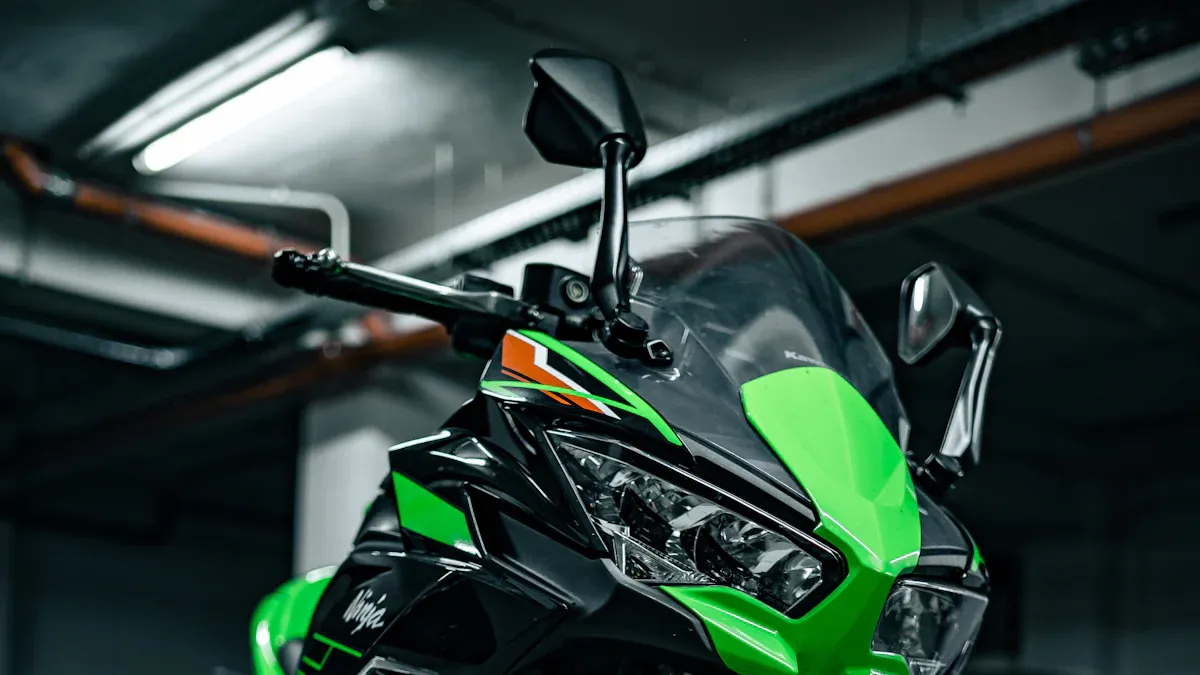
Standout Features of the 2005 Kawasaki ZX10R
The 05 kawasaki zx10r brought a new level of excitement to the ninja lineup. Riders noticed its compact chassis, which felt similar to a 600cc sports bike. This design made the kawasaki zx-10r nimble and easy to handle. The 2005 kawasaki zx10r used a liquid-cooled 998 cc inline four-cylinder engine. Kawasaki engineers arranged the crankshaft, input shaft, and output shaft in a unique triangular layout. This setup reduced engine size and improved the bike’s power-to-weight ratio.
Key features of the zx-10r included:
- High power-to-weight ratio and short wheelbase for sharp agility
- DOHC valvetrain machined from Chromoly steel for strength
- Four valves per cylinder for better high-rpm breathing
- Forged lightweight pistons for heat resistance
- Multi-plate wet slipper clutch with back-torque limiter to prevent rear-wheel hop
- Fully titanium exhaust system with a single muffler
- New six-spoke wheels, nearly as light as race wheels
- Computer-controlled digital transistorized ignition system
- Output of 148.2 hp and about 76 lb-ft of torque
- Zero to sixty mph in just 3.12 seconds
These features made the kawasaki zx-10r a standout ninja in the sports bike world. Riders appreciated the advanced engineering and the thrilling performance.
ZX10R Legacy and Rider Appeal
The zx10r left a strong mark on the kawasaki ninja family. Many riders admired the bike’s aggressive look and sharp handling. The kawasaki zx-10r impressed sportbike fans with its competitive chassis and powerful engine. However, some critics pointed out the undertail exhaust and smaller headlights, which gave the ninja a unique appearance. Over time, the zx-10r shifted from a wild, unpredictable bike to a more controlled ride. This change led some to feel the kawasaki zx-10r became less aggressive, but it still held a loyal following. The bike continued to set high standards for the ninja series and influenced rider expectations for future kawasaki zx-10r models.
Note: The zx-10r’s legacy lives on in the strong community of ninja enthusiasts who value both performance and character.
Kawasaki Ninja ZX-10R Performance Comparison
Power and Acceleration
The kawasaki ninja zx-10r stands out for its impressive engine and strong power delivery. In 2005, the zx-10r produced about 155 horsepower, which made it one of the most powerful ninja models at the time. Riders noticed the rear wheel power, especially when pushing the bike on the track. The kawasaki zx-10r engine gives a thrilling rush as the rpm climbs. Today’s liter bikes, like the BMW S1000RR, have even more power and quicker acceleration. The 2005 kawasaki ninja zx-10r reaches 0-60 mph in about 2.9 seconds, while modern bikes can do it in 2.6 seconds. The zx-10r’s quarter-mile time is just under 10 seconds, showing strong performance for its era. The table below compares horsepower:
| Model | Horsepower (hp) |
|---|---|
| 2005 Kawasaki ZX-10R | 155 |
| Kawasaki ZX-6R | 111.6 |
The kawasaki zx-10r may not match the top speed or acceleration of the latest ninja models, but it still delivers a fast and exciting ride.
Handling and Chassis Dynamics
The kawasaki ninja zx-10r uses a lightweight all-aluminum frame, which helps with sharp handling. The narrow profile and thin-walled castings make the bike feel agile on the track. Riders often praise the zx-10r for its razor-sharp reflexes and quick direction changes. The technical specification of the suspension includes fully adjustable 43mm front forks and a rear shock with ride height adjustment. The kawasaki zx-10r’s handling overall feels aggressive, making it a favorite for riders who want a lively ninja. Newer models offer more stability and a calmer ride, but the 2005 kawasaki zx-10r keeps its race-inspired edge.
Braking and Control
The kawasaki ninja zx-10r features dual 300mm petal-type front brake discs and radial four-piston calipers. These brakes give strong stopping power and good lever feel. The zx-10r was the first ninja to use petal discs, which help with cooling and reduce weight. The slipper clutch helps prevent rear wheel lockup during hard braking on the track. Modern liter bikes now use advanced electronics and monoblock calipers, which improve control and shorten stopping distances. Still, the kawasaki zx-10r’s braking system remains impressive for its time and gives riders confidence during aggressive riding.
ZX-10R Reliability and Maintenance
Engine Durability and Common Issues
The kawasaki zx-10r has a reputation for strong engine performance, but owners have reported several common engine issues. Most problems relate to the fuel pump, which can affect how the engine runs. Riders notice these issues through symptoms that impact daily use and reliability.
- Hard starting or long cranking times often signal leaking check valves or weak fuel pump pressure in the engine.
- Engine sputtering or hesitation under load points to poor fuel delivery.
- Loss of power or bogging down, especially during acceleration, shows the engine is not getting enough fuel.
- Engine stalling at idle or under light load can frustrate riders.
- A whining or high-pitched noise from the fuel tank area may mean problems with the pump motor or intake sock.
- Failure to start with no fuel pump priming noise suggests pump motor or electrical issues in the engine.
- The "Check Engine" light sometimes appears because of lean fuel mixture codes linked to fuel delivery.
These engine problems usually come from worn motor brushes, armature and commutator wear, clogged filter socks, failed check valves, corroded connectors, or fuel degradation. Riders who keep up with regular checks can often catch these engine issues early.
Maintenance Needs and Fixes
The kawasaki zx-10r requires regular maintenance to keep the engine and other parts running well. Owners must follow a strict schedule, which helps prevent major engine problems. The table below shows the main maintenance tasks and how often they should be done:
| Maintenance Task | Interval/Frequency |
|---|---|
| Valve Adjustment | Every 24,000 km (15,000 mi) |
| Oil Change | Every 5,000 km or 2 years |
| Coolant Replacement | Every 2 years |
| Chain Lubrication | Every 500 km (310 miles) |
The kawasaki zx-10r needs more frequent and demanding maintenance than many modern liter bikes. Tasks like oil changes, valve adjustments, and chain care can cost more because of the bike’s age and the need for quality parts. Owners report that oil changes and brake pads are not cheap, but they see the value in keeping the engine healthy. Enthusiasts believe that regular care helps the kawasaki zx-10r engine last longer and perform better. Riders who stay on top of maintenance enjoy a reliable zx-10r experience.
Common Modifications for the 05 Kawasaki ZX10R
Performance Upgrades and Tuning
Many riders look for ways to boost the power and performance of the 2005 Kawasaki ZX10R. One of the most popular modifications is the Power Commander V fuel tuner. This device helps the engine run better by adjusting the air and fuel mixture. Riders can use different fuel maps to get more horsepower at the wheel. The Power Commander V does not change the bike’s ECU, so owners can return to the original settings if needed. This tuner also works well with aftermarket exhaust systems. When combined, these upgrades unlock extra power and improve throttle response. Riders often add high-flow air filters from brands like UNI, BMC, K&N, or Pipercross. These filters let the engine breathe easier and support more power. Some riders change the sprockets, using a -1 tooth on the front and a +1 on the rear, to improve acceleration and top speed. These performance upgrades make the ZX10R feel faster and more responsive.
Suspension and Handling Mods
Handling is a key part of the ZX10R’s appeal. Many owners choose a suspension upgrade to improve ride quality and control. The stock rear shock often limits the bike’s performance, especially at higher speeds. Riders replace it with an Ohlins 46PRXLS shock, which offers better adjustment and smoother operation. Upgrading the fork internals with Ohlins cartridge kits is another common modification. Some riders swap the original forks for second-generation ZX-10R forks with Ohlins cartridges. These changes help the bike stay stable and planted during hard cornering. A proper suspension setup by a skilled technician can make a big difference in confidence and lap times. Aftermarket shocks give more grip and reduce sliding, which helps both new and experienced riders. These mods improve handling and make the ZX10R safer and more fun to ride.
Tip: A suspension upgrade not only boosts performance but also increases rider comfort and confidence, especially on rough roads or the racetrack.
Brake and Control Enhancements
Strong brakes and precise controls are important for safe riding. Many ZX10R owners upgrade the stock rubber brake lines to stainless steel braided lines. These lines prevent expansion under pressure, which removes the spongy feeling during hard braking. Riders notice better brake feel, more control, and shorter stopping distances. Some also upgrade the calipers or rotors, but most find that quality pads, fresh brake fluid, and stainless lines are enough for daily and track use. For even more control, riders install aftermarket master cylinders like the RCS19CC. This upgrade gives a firmer lever feel and lets riders brake harder with less effort.
A rider shared, “After switching to a high-quality master cylinder, I could brake later and stronger. My confidence grew, and the bike felt much safer.”
Another rider warned about using cheap levers: “Low-quality levers caused my brakes to seize on the highway. After replacing them with CRG levers, my bike felt 100% normal again.”
These brake and control mods help riders feel more in command of their ZX10R, making every ride safer and more enjoyable.
Weight Reduction and Cosmetic Changes
Riders often look for ways to make the 2005 Kawasaki ZX10R lighter and more attractive. They choose upgrades that help the bike perform better and stand out on the road. Many owners replace heavy stock parts with lighter options. For example, they swap steel exhaust systems for slip-on models made from titanium or carbon fiber. This change lowers the bike’s weight and gives it a sharper sound.
Some riders install lightweight wheels. These wheels reduce the force needed to turn and help the bike accelerate faster. Others remove unnecessary parts, such as passenger pegs or bulky mirrors, to save even more weight. Every pound lost can make the ZX10R feel quicker and easier to handle.
Cosmetic changes also play a big role in the bike’s appeal. Owners often upgrade the fairings with high-quality ABS material. These fairings fit perfectly on the 2004-2005 Kawasaki ZX10R and offer better durability than cheaper options. The paint finish uses a seven-layer UV-resistant process. This method creates a bright and long-lasting look. Riders can choose custom colors and designs to make their bike unique.
Note: High-quality fairings and custom paint not only improve the bike’s appearance but also increase its resale value. Buyers often pay more for a ZX10R that looks fresh and well cared for.
Many riders believe that these upgrades make their bike more desirable. They see that a well-maintained and personalized ZX10R attracts more attention and can sell for a higher price.
How Mods Affect Competitiveness
Upgrades help the 2005 Kawasaki ZX10R keep up with newer liter bikes. Riders focus on three main areas: weight, braking, and handling. They often install an Akrapović slip-on exhaust to reduce weight and improve sound. This change makes the bike lighter and more responsive.
Brake pad replacements with sintered compounds give the ZX10R stronger stopping power. Riders feel safer and more confident, especially during track days. Suspension tuning also plays a key role. Adjustments to preload and damping help the bike match the rider’s style and weight. These changes make the ZX10R handle better in corners and stay stable at high speeds.
Modern liter bikes have advanced electronics and suspension systems. The ZX10R does not offer these features, but smart upgrades help close the gap. Riders who invest in these mods find that their bike performs well against newer models. Track-day fans and collectors still choose the ZX10R for its strong engine and sharp handling.
Tip: Regular upgrades and careful tuning keep the 2005 Kawasaki ZX10R competitive. Riders enjoy spirited rides and feel proud of their classic sportbike.
These improvements show that the ZX10R can still deliver excitement and performance. Owners who upgrade their bikes see real benefits in speed, control, and value.
ZX10R Value and Ownership Experience
Cost of Ownership and Upkeep
The 2005 Kawasaki ZX10R offers strong value for riders who want a high-performance sportbike. Owners find that the cost of ownership stays reasonable compared to newer models. The engine uses quality parts, but regular maintenance is important. Oil changes, valve checks, and chain care keep the engine running smoothly. Replacement parts for the Kawasaki ZX10R are easy to find and often cost less than parts for modern superbikes. Insurance rates for this model remain fair because the bike is not as expensive as newer liter bikes. Riders who perform their own maintenance save money and learn more about the engine. Upgrades like better brake pads or suspension parts add to the cost, but many owners see these as smart investments.
| Expense Type | Typical Cost (USD) |
|---|---|
| Oil Change | $40 - $70 |
| Valve Adjustment | $250 - $400 |
| Chain/Sprocket Set | $150 - $250 |
| Insurance (annual) | $300 - $600 |
Real-World Reliability and Longevity
Owners praise the Kawasaki ZX10R for its reliable engine and strong build quality. Many riders report that the engine lasts for years with regular care. The engine handles high rpm and hard riding without major problems. Some owners mention fuel pump issues, but most problems are easy to fix. The engine rarely suffers from serious failures. Riders who follow the maintenance schedule see the engine reach high mileage. The Kawasaki ZX10R stands out as a dependable choice for those who want a bike that lasts. Riders trust the engine to deliver power and excitement every time they ride.
Note: Regular maintenance and careful riding help the engine stay healthy and extend the life of the Kawasaki ZX10R.
Rider Feedback and Community Insights
Riders share many positive experiences with the 2005 Kawasaki ZX10R. They describe the bike as light, powerful, and fun to ride. The engine gives a thrilling rush at high speeds. Handling feels sharp, but some riders notice headshake if the suspension is not set up well. Braking works well for most uses, though upgrades improve performance on the track. Comfort matches other sportbikes, with firm suspension and a decent seat. Fuel economy surprises many riders, allowing longer trips without frequent stops. The digital tachometer receives minor complaints, but it does not affect the overall experience. Owners value the Kawasaki ZX10R for its reliability, strong engine, and affordable price. Many riders keep their bikes for years and enjoy making upgrades.
- Powerful engine with exciting top-end performance
- Excellent handling and cornering ability
- Good braking, with room for improvement
- Firm suspension, best for track use
- Reliable and well-built, great value on the used market
- Popular upgrades include suspension and brake improvements
- Emotional attachment and classic status among Kawasaki fans
05 Kawasaki ZX10R vs. Modern Liter Bikes
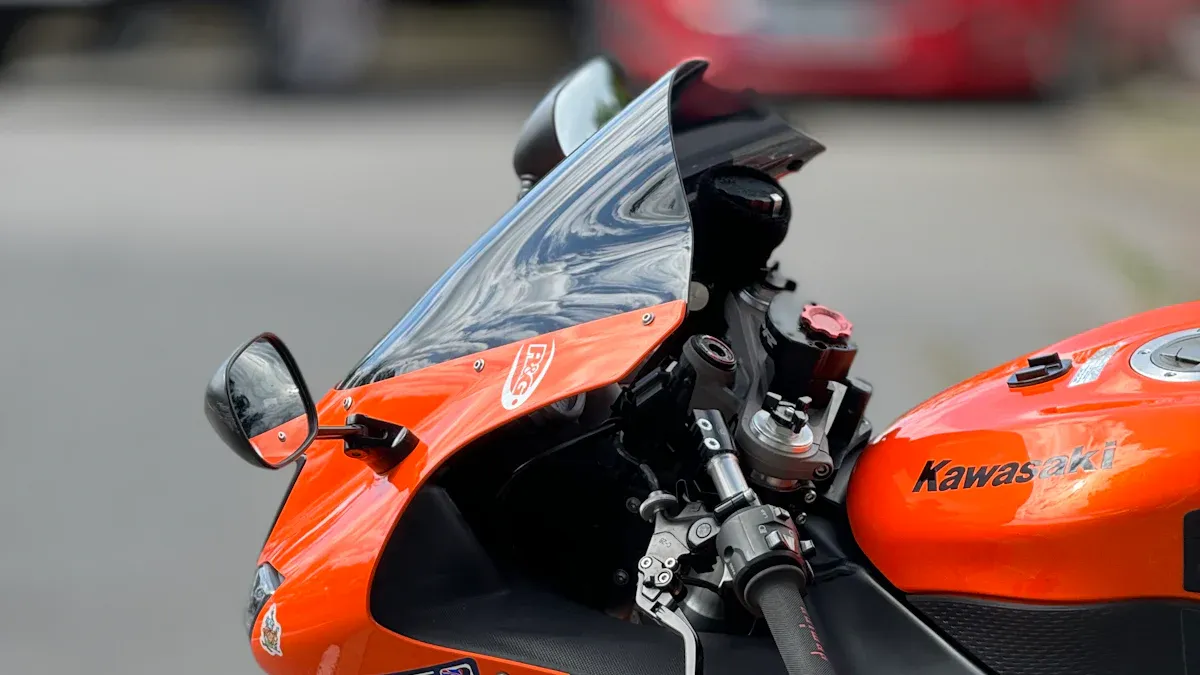
What’s Still Competitive Today
The 2005 Kawasaki Ninja ZX-10R still impresses riders with its strong performance in several areas. Many enthusiasts see the bike as a true ninja, offering a thrilling ride that stands out even among today’s 1000cc superbikes. The engine delivers up to 184 horsepower with ram air, which keeps the bike fast on the track and street. Riders feel the power as soon as they twist the throttle. The lightweight design, at only 170 kg dry, gives the ninja an excellent power-to-weight ratio. This makes the bike quick in acceleration and nimble in corners.
The chassis uses an aluminum double-beam spine frame, which helps the ninja stay stable at high speeds. The inverted 43 mm forks and radial-mount four-piston calipers with petal-cut brake discs provide strong braking and sharp handling. Many riders enjoy the lively and demanding nature of the kawasaki ninja zx-10r, especially during a trackday. The bike’s top speed reaches 295 km/h, which matches many modern liter bikes. The table below shows how the 2005 kawasaki ninja zx-10r compares in key performance areas:
| Performance Area | Details |
|---|---|
| Engine Power | 175 hp at 11,700 rpm; 184 hp with ram air |
| Dry Weight | 170 kg (375 lb) |
| Power-to-Weight Ratio | Exceptional due to high power and low weight |
| Frame | Aluminum double-beam spine frame |
| Front Suspension | Inverted 43 mm telehydraulic forks |
| Braking System | Radial-mount 4-piston calipers with petal-cut brake discs |
| Acceleration | 0-100 km/h in 3 seconds |
| Top Speed | 295 km/h |
| Chassis Dynamics | Stable and lively, demanding but rewarding handling |
| Rider Feedback | Thrilling acceleration and power delivery, requires skill and composure due to aggressive nature |
The kawasaki ninja zx-10r remains a favorite for riders who want a raw, exciting superbike. Its engine, chassis, and brakes still compete with many new bikes on the track.
Where the 05 ZX10R Falls Behind
The 2005 kawasaki ninja zx-10r shows its age in several important ways. Modern liter bikes now come with advanced electronics and safety features that make riding easier and safer. The ninja from 2005 has a simple LCD dash with a lap timer and shift light. It does not have traction control, ABS, ride modes, or electronic steering dampers. Riders must rely on their own skill to control the bike, especially at high speeds or in tricky conditions.
Modern kawasaki ninja zx-10r models and other liter bikes offer electronic aids that help prevent wheel spin, lock-up, or loss of control. These features make new bikes more forgiving for less experienced riders. The 2005 ninja uses a firm, race-oriented suspension that can feel harsh on city streets. The aggressive chassis and lack of electronic support make the bike challenging for daily use. Riders who want comfort and safety may find the older ninja less appealing.
Note: The kawasaki ninja zx-10r delivers a pure, mechanical riding experience. This appeals to some riders but can be risky for others who expect modern safety features.
In the 2005 open supersport shootout, the kawasaki ninja zx-10r ranked just behind the top three bikes. It offered great performance but did not match the overall balance and rider confidence of the best superbikes of its time. Today, the gap has grown as new bikes add more technology and refinement.
Who Should Consider the 2005 Kawasaki ZX10R
The 2005 kawasaki ninja zx-10r fits riders who want a classic ninja experience. This bike suits those who value raw power, sharp handling, and a direct connection to the road. Experienced riders who enjoy the challenge of a demanding superbike will appreciate the aggressive nature of the ninja. Track enthusiasts and collectors often choose this bike for its strong engine and lively chassis. The kawasaki ninja zx-10r also attracts riders who want a unique trackday machine that stands out from the crowd.
New riders or those who want advanced safety features may prefer a modern kawasaki ninja zx-10r or another liter bike. The older ninja requires skill and respect, especially on the track or at high speeds. Riders who enjoy working on their bikes and making upgrades will find the 2005 model rewarding. The strong community of ninja fans offers support, advice, and a sense of belonging.
Tip: Riders who want a thrilling, old-school superbike experience should consider the 2005 kawasaki ninja zx-10r. Those who need comfort, safety, and modern electronics may want to look at newer 1000cc superbikes.
The 2005 Kawasaki ZX10R gives riders a thrilling experience. This bike stands out for its strong engine, reliable build, and steady value. Riders notice the bike’s spirited performance and stable handling. Many choose this bike for its classic feel and loyal community. Upgrades help the bike compete with newer models. The table below shows how experts rate the bike’s strengths and weaknesses.
| Aspect | Strengths | Weaknesses |
|---|---|---|
| Engine | Spirited, refined, tunable | No traction control |
| Value | Good price, upgradeable | Needs investment |
| Handling | Stable, can be improved | Lazy handling, poor brakes |
Riders should think about what matters most before picking this bike over a modern option.
FAQ
Is the 2005 Kawasaki ZX10R a good choice for new riders?
The 2005 ZX10R offers strong power and sharp handling. Most experts recommend it for experienced riders. New riders may find the bike’s aggressive nature and lack of electronic aids challenging.
What are the most common upgrades for the 2005 ZX10R?
Owners often upgrade the suspension, brakes, and exhaust. Many choose a Power Commander for tuning. Lightweight wheels and custom fairings also remain popular. These changes improve performance and appearance.
How does the 2005 ZX10R compare to modern liter bikes?
The 2005 ZX10R delivers raw power and a classic sportbike feel. Modern liter bikes offer advanced electronics, better safety, and smoother rides. The older ZX10R still competes in speed and excitement.
What maintenance does the 2005 ZX10R require?
Regular oil changes, valve adjustments, and chain care keep the bike running well. Owners should check the fuel pump and brakes often. Following the maintenance schedule helps the ZX10R stay reliable.
See Also
Reasons Kawasaki ZX10RR Surpasses ZX10R Model In 2025
Comparing Race And Street Fairings For Kawasaki ZX-6R
Complete 2025 Review Of The Kawasaki Ninja H2R
